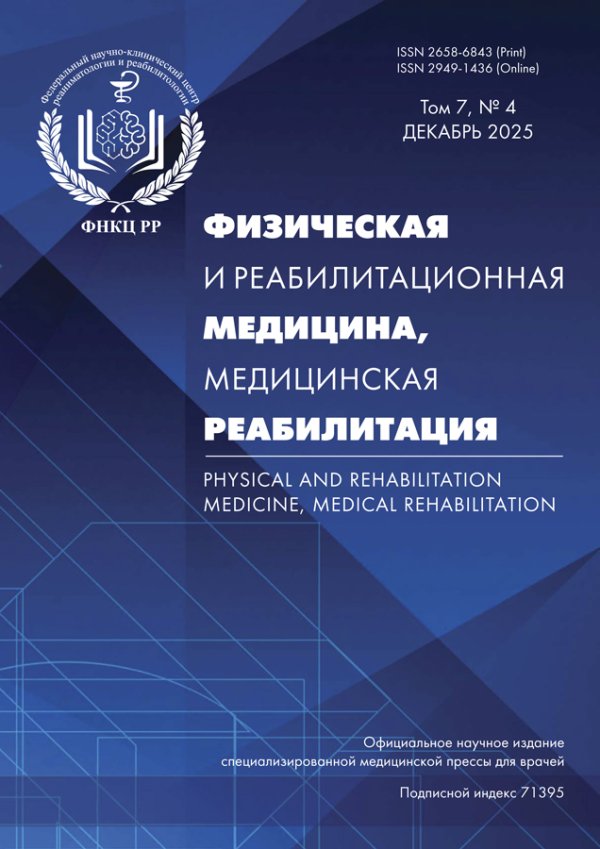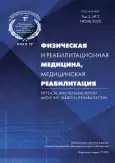Potential effects of COVID-19 on the cardiovascular system
- Authors: Mikhaylovskaya T.V.1, Yakovleva N.D.2, Safronov M.A.1, Kharlamova Y.I.3
-
Affiliations:
- Federal State Budgetary Educational Institution of Higher Education “Ivanovo State Medical Academy” of the Ministry of Healthcare of the Russian Federation
- Medis Clinic
- Аrkadiya Plus
- Issue: Vol 2, No 2 (2020)
- Pages: 133-139
- Section: REVIEWS
- URL: https://journal-vniispk.ru/2658-6843/article/view/34080
- DOI: https://doi.org/10.36425/rehab34080
- ID: 34080
Cite item
Full Text
Abstract
It is known that coronaviruses can cause acute coronary syndrome, arrhythmias, and aggravation of heart failure, mainly due to a combination of a significant systemic inflammatory response and a local vascular inflammation at the level of arterial plaque. In the context of massive SARS-CoV-2infections and the announced pandemic, there is a need to update management of cardiovascular patients in order to reduce COVID-19-related complications. COVID-19 can cause viral pneumonia, as well as extrapulmonary symptoms and complications. A larger proportion of severe COVID-19 patients had a cardiovascular disease or a high cardiovascular risk. The presence of arterial hypertension and other cardiovascular and cerebrovascular diseases is considered as a factor aggravating the course of the disease and increasing the lethality. Severe cases of COVID-19 were accompanied by acute, often lethal, cardiovascular disorders, with an increase in the level of highly sensitive troponins. There is no reliable evidence that angiotensin-converting enzyme inhibitors and angiotensin receptor blockers can increase the risk of infection or severe course of COVID-19, so there is no reason to cancel them. The role of inhibition of the renin-angiotensin system in the treatment of COVID-19 remains controversial. COVID-19 treatment boils down to supportive care and treatment for complications. Based on the results of the studies, a large number of cardiovascular complications of COVID-19 can be expected. Their therapy should be carried out strictly according to modern guidelines. Recommendations include antiplatelet agents, β-blockers, ACE inhibitors and statins.
Keywords
Full Text
##article.viewOnOriginalSite##About the authors
Tatyana V. Mikhaylovskaya
Federal State Budgetary Educational Institution of Higher Education “Ivanovo State Medical Academy” of the Ministry of Healthcare of the Russian Federation
Author for correspondence.
Email: tanyadoc8484@mail.ru
ORCID iD: 0000-0002-4329-098X
SPIN-code: 7209-0144
MD, PhD
Russian Federation, IvanovoNataliya D. Yakovleva
Medis Clinic
Email: n.d.karpova@inbox.ru
ORCID iD: 0000-0003-4734-9237
Russian Federation, Ivanovo
Maksim A. Safronov
Federal State Budgetary Educational Institution of Higher Education “Ivanovo State Medical Academy” of the Ministry of Healthcare of the Russian Federation
Email: pack90@bk.ru
ORCID iD: 0000-0002-9630-4230
SPIN-code: 7922-4184
Russian Federation, Ivanovo
Yana I. Kharlamova
Аrkadiya Plus
Email: kafedra-ht@rambler.ru
ORCID iD: 0000-0001-9459-5962
SPIN-code: 6070-1100
Russian Federation, Ivanovo
References
- Su S, Wong G, Shi W, et al. Epidemiology, genetic recombination, and pathogenesis of coronaviruses. Trends Microbiol. 2016;24(6):490–502. doi: 10.1016/j.tim.2016.03.003.
- Falsey AR, Walsh EE, Hayden FG. Rhinovirus and coronavirus infection-associated hospitalizations among older adults. J Infect Dis. 2002;185(9):1338–1341. doi: 10.1086/339881.
- El-Sahly HM, Atmar RL, Glezen WP, Greenberg SB. Spectrum of clinical illness in hospitalized patients with “common cold” virus infections. Clin Infect Dis. 2000; 31(1):96–100. doi: 10.1086/313937.
- Guan WJ, Ni ZY, Hu Y, et al. China medical treatment expert group for Covid-19. Clinical characteristics of coronavirus disease 2019 in China. N Engl J Med. 2020; 382(18):1708–1720. doi: 10.1056/NEJMoa2002032.
- Madjid M, Safavi-Naeini P, Solomon SD, Vardeny O. Potential effects of coronaviruses on the cardiovascular system: a review. JAMA Cardiol. 2020. doi: 10.1001/jamacardio.2020.1286.
- Peiris JS, Chu CM, Cheng VC, et al. HKU/UCH SARS study group. Clinical progression and viral load in a community outbreak of coronavirus-associated SARS pneumonia: a prospective study. Lancet. 2003;361(9371): 1767–1772. doi: 10.1016/S0140-6736(03)13412-5.
- Li SS, Cheng CW, Fu CL, et al. Left ventricular performance in patients with severe acute respiratory syndrome: a 30-day echocardiographic follow-up study. Circulation. 2003;108(15):1798–1803. doi: 10.1161/01.CIR.0000094737.21775.32.
- Yu CM, Wong RS, Wu EB, et al. Cardiovascular complications of severe acute respiratory syndrome. Postgrad. Med. J. 2006;82(964):140–144. doi: 10.1136/pgmj.2005.037515.
- Chong PY, Chui P, Ling AE, et al. Analysis of deaths during the severe acute respiratory syndrome (SARS) epidemic in Singapore: challenges in determining a SARS diagnosis. Arch Pathol Lab Med. 2004;128(2):195–204. doi: 10.1043/1543-2165(2004)128<195:AODDTS>2.0.CO;2.
- Hughes S. COVID-19: AHA Guidance on Hypertension, Latest on Angiotensin Link [cited 2020 April 01]. Available at: https://www.medscape.com/viewarticle/927952.
- Xu Z, Shi L, Wang Y, et al. Pathological findings of COVID-19 associated with acute respiratory distress syndrome. Lancet Respir. Med. 2020:8(4):420–422. doi: 10.1016/S2213-2600(20)30076-X.
- Shi S, Qin M, Shen B, et al. Cardiac injury in patients with corona virus disease 2019. JAMA Cardiol. 2020. doi: 10.1001/jamacardio.2020.0950.
- Guo T, Fan Y, Chen M, et al. Association of cardiovascular disease and myocardial injury with outcomes of patients hospitalized with 2019-coronavirus disease (COVID-19). JAMA Cardiol. 2020. doi: 10.1001/jamacardio.2020.1017.
- Ruan Q, Yang K, Wang W, et al. Clinical predictors of mortality due to COVID-19 based on an analysis of data of 150 patients from Wuhan, China. Intensive Care Med. 2020;46(5):846–848. doi: 10.1007/s00134-020-05991-x.
- Novel Coronavirus Pneumonia Emergency Response Epidemiology Team. The epidemiological characteristics of an outbreak of 2019 novel coronavirus diseases (COVID-19) in China. Zhonghua Liu Xing Bing Xue Za Zhi. 2020;41(2):145–51. doi: 10.3760/cma.j.issn.0254- 6450.2020.02.003.
- Donoghue M, Hsieh F, Baronas E, et al. A novel angiotensin-converting enzyme-related carboxypeptidase (ACE2) converts angiotensin I to angiotensin 1–9. Circ Res. 2000; 87(5):E1–9. doi: 10.1161/01.res.87.5.e1.
- Tallant EA, Clark MA. Molecular mechanisms of inhibition of vascular growth by angiotensin-(1-7). Hypertension. 2003;42(4):574–579. doi: 10.1161/01.HYP.0000090322. 55782.30.
- Santos RA, Simoes AC, Maric C, et al. Angiotensin-(1-7) is an endogenous ligand for the G protein-coupled receptor mas. Proc Natl Acad Sci USA. 2003;100(14):8258–8263. doi: 10.1073/pnas.1432869100.
- Hamming I, Timens W, Bulthuis ML, et al. Tissue distribution of ACE2 protein, the functional receptor for SARS coronavirus. A first step in understanding SARS pathogenesis. J Pathol. 2004;203(2):631–637. doi: 10.1002/path.1570.
- Turner AJ, Hiscox JA, Hooper NM. ACE2: from vasopeptidase to SARS virus receptor. Trends Pharmacol Sci. 2004;25(6):291–294. doi: 10.1016/j.tips.2004.04.001.
- Wan Y, Shang J, Graham R, et al. Receptor recognition by the novel coronavirus from Wuhan: an analysis based on decade-long structural studies of SARS сoronavirus. J Virol. 2020;94(7):e00127-20. doi: 10.1128/JVI.00127-20.
- Zou X, Chen K, Zou J, et al. Single-cell RNA-seq data analysis on the receptor ACE2 expression reveals the potential risk of different human organs vulnerable to 2019-nCoV infection. Front Med. 2020;14(2):185–192. doi: 10.1007/s11684-020-0754-0.
- Xu H, Zhong L, Deng J, et al. High expression of ACE2 receptor of 2019-nCoV on the epithelial cells of oral mucosa. Int J Oral Sci. 2020;12(1):8. doi: 10.1038/s41368-020-0074-x.
- Qi F, Qian S, Zhang S, Zhang Z. Single cell RNA sequencing of 13 human tissues identify cell types and receptors of human coronaviruses. Biochem Biophys Res Commun. 2020;526(1):135–140. doi: 10.1016/j.bbrc.2020.03.044.
- Kuba K, Imai Y, Rao S, et al. A crucial role of angiotensin converting enzyme 2 (ACE2) in SARS coronavirus-induced lung injury. Nat Med. 2005;11(8):875–879. doi: 10.1038/nm1267.
- Wrapp D, Wang N, Corbett KS, et al. Cryo-EM structure of the 2019-nCoV spike in the prefusion conformation. Science. 2020;367(6483):1260–1263. doi: 10.1126/science.abb2507.
- Fang L, Karakiulakis G, Roth M. Are patients with hypertension and diabetes mellitus at increased risk for COVID-19 infection? Lancet Respir Med. 2020;8(4):e21. doi: 10.1016/S2213-2600(20)30116-8.
- Watkins J. Preventing a COVID-19 pandemic. BMJ. 2020;368:m810. doi: 10.1136/bmj.m810.
- Esler M, Esler D. Can angiotensin receptor-blocking drugs perhaps be harmful in the COVID-19 pandemic? J Hypertens. 2020;38(5):781–782. doi: 10.1097/HJH.0000000000002450.
- Report sulle caratteristiche dei pazienti deceduti positivi a COVID-19 in Italia, 20 Marzo 2020 [cited 2020 March 23]. Available at: https://www.epicentro.iss.it/coronavirus/bollettino/Report-COVID-2019_20_marzo.pdf.
- Tignanelli CJ, Ingraham NE, Sparks MA, et al. Antihypertensive drugs and risk of COVID-19? Lancet Resp Med. 2020;8(5):e30–e31. doi: 10.1016/S2213-2600(20)30153-3.
- Sanchis-Gomar F, Lavie CJ, Perez-Quilis C, et al. Angiotensin-converting enzyme 2 and anti-hypertensives (angiotensin receptor blockers and angiotensin converting enzyme inhibitors) in coronavirus disease 2019. Mayo Clin Proc. 2020. doi: 10.1016/j.mayocp.2020.03.026.
- Vaduganathan M, Vardeny O, Michel T, et al. Renin–angiotensin–aldosterone system inhibitors in patients with Covid-19. N Engl J Med. 2020;382(17):1653–1659. doi: 10.1056/NEJMsr2005760.
Supplementary files








